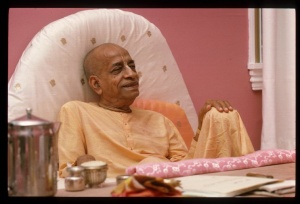SB 9.23.7-10: Difference between revisions
No edit summary |
(Vanibot #0054 edit - transform synonyms into clickable links, which search similar occurrences) |
||
| Line 38: | Line 38: | ||
<div class="synonyms"> | <div class="synonyms"> | ||
''sutaḥ'' | ''[//vanipedia.org/wiki/Special:VaniSearch?s=sutaḥ&tab=syno_o&ds=1 sutaḥ]'' — a son; ''[//vanipedia.org/wiki/Special:VaniSearch?s=dharmarathaḥ&tab=syno_o&ds=1 dharmarathaḥ]'' — Dharmaratha; ''[//vanipedia.org/wiki/Special:VaniSearch?s=yasya&tab=syno_o&ds=1 yasya]'' — of whom (Diviratha); ''[//vanipedia.org/wiki/Special:VaniSearch?s=jajñe&tab=syno_o&ds=1 jajñe]'' — was born; ''[//vanipedia.org/wiki/Special:VaniSearch?s=citrarathaḥ&tab=syno_o&ds=1 citrarathaḥ]'' — Citraratha; ''[//vanipedia.org/wiki/Special:VaniSearch?s=aprajāḥ&tab=syno_o&ds=1 aprajāḥ]'' — without any sons; ''[//vanipedia.org/wiki/Special:VaniSearch?s=romapādaḥ&tab=syno_o&ds=1 romapādaḥ]'' — Romapāda; ''[//vanipedia.org/wiki/Special:VaniSearch?s=iti&tab=syno_o&ds=1 iti]'' — thus; ''[//vanipedia.org/wiki/Special:VaniSearch?s=khyātaḥ&tab=syno_o&ds=1 khyātaḥ]'' — celebrated; ''[//vanipedia.org/wiki/Special:VaniSearch?s=tasmai&tab=syno_o&ds=1 tasmai]'' — unto him; ''[//vanipedia.org/wiki/Special:VaniSearch?s=daśarathaḥ&tab=syno_o&ds=1 daśarathaḥ]'' — Daśaratha; ''[//vanipedia.org/wiki/Special:VaniSearch?s=sakhā&tab=syno_o&ds=1 sakhā]'' — friend; ''[//vanipedia.org/wiki/Special:VaniSearch?s=śāntām&tab=syno_o&ds=1 śāntām]'' — Śāntā; ''[//vanipedia.org/wiki/Special:VaniSearch?s=sva&tab=syno_o&ds=1 sva]-[//vanipedia.org/wiki/Special:VaniSearch?s=kanyām&tab=syno_o&ds=1 kanyām]'' — Daśaratha's own daughter; ''[//vanipedia.org/wiki/Special:VaniSearch?s=prāyacchat&tab=syno_o&ds=1 prāyacchat]'' — delivered; ''[//vanipedia.org/wiki/Special:VaniSearch?s=ṛṣyaśṛṅgaḥ&tab=syno_o&ds=1 ṛṣyaśṛṅgaḥ]'' — Ṛṣyaśṛṅga; ''[//vanipedia.org/wiki/Special:VaniSearch?s=uvāha&tab=syno_o&ds=1 uvāha]'' — married; ''[//vanipedia.org/wiki/Special:VaniSearch?s=yām&tab=syno_o&ds=1 yām]'' — unto her (Śāntā); ''[//vanipedia.org/wiki/Special:VaniSearch?s=deve&tab=syno_o&ds=1 deve]'' — the demigod in charge of rainfall; ''[//vanipedia.org/wiki/Special:VaniSearch?s=avarṣati&tab=syno_o&ds=1 avarṣati]'' — did not shower any rain; ''[//vanipedia.org/wiki/Special:VaniSearch?s=yam&tab=syno_o&ds=1 yam]'' — unto whom (Ṛṣyaśṛṅga); ''[//vanipedia.org/wiki/Special:VaniSearch?s=rāmāḥ&tab=syno_o&ds=1 rāmāḥ]'' — prostitutes; ''[//vanipedia.org/wiki/Special:VaniSearch?s=āninyuḥ&tab=syno_o&ds=1 āninyuḥ]'' — brought; ''[//vanipedia.org/wiki/Special:VaniSearch?s=hariṇī&tab=syno_o&ds=1 hariṇī]-[//vanipedia.org/wiki/Special:VaniSearch?s=sutam&tab=syno_o&ds=1 sutam]'' — that Ṛṣyaśṛṅga, who was the son of a doe; ''[//vanipedia.org/wiki/Special:VaniSearch?s=nāṭya&tab=syno_o&ds=1 nāṭya]-[//vanipedia.org/wiki/Special:VaniSearch?s=saṅgīta&tab=syno_o&ds=1 saṅgīta]-[//vanipedia.org/wiki/Special:VaniSearch?s=vāditraiḥ&tab=syno_o&ds=1 vāditraiḥ]'' — by dancing, by singing and by a musical display; ''[//vanipedia.org/wiki/Special:VaniSearch?s=vibhrama&tab=syno_o&ds=1 vibhrama]'' — bewildering; ''[//vanipedia.org/wiki/Special:VaniSearch?s=āliṅgana&tab=syno_o&ds=1 āliṅgana]'' — by embracing; ''[//vanipedia.org/wiki/Special:VaniSearch?s=arhaṇaiḥ&tab=syno_o&ds=1 arhaṇaiḥ]'' — by worshiping; ''[//vanipedia.org/wiki/Special:VaniSearch?s=saḥ&tab=syno_o&ds=1 saḥ]'' — he (Ṛṣyaśṛṅga); ''[//vanipedia.org/wiki/Special:VaniSearch?s=tu&tab=syno_o&ds=1 tu]'' — indeed; ''[//vanipedia.org/wiki/Special:VaniSearch?s=rājñaḥ&tab=syno_o&ds=1 rājñaḥ]'' — from Mahārāja Daśaratha; ''[//vanipedia.org/wiki/Special:VaniSearch?s=anapatyasya&tab=syno_o&ds=1 anapatyasya]'' — who was without issue; ''[//vanipedia.org/wiki/Special:VaniSearch?s=nirūpya&tab=syno_o&ds=1 nirūpya]'' — after establishing; ''[//vanipedia.org/wiki/Special:VaniSearch?s=iṣṭim&tab=syno_o&ds=1 iṣṭim]'' — a sacrifice; ''[//vanipedia.org/wiki/Special:VaniSearch?s=marutvate&tab=syno_o&ds=1 marutvate]'' — of the demigod named Marutvān; ''[//vanipedia.org/wiki/Special:VaniSearch?s=prajām&tab=syno_o&ds=1 prajām]'' — issue; ''[//vanipedia.org/wiki/Special:VaniSearch?s=adāt&tab=syno_o&ds=1 adāt]'' — delivered; ''[//vanipedia.org/wiki/Special:VaniSearch?s=daśarathaḥ&tab=syno_o&ds=1 daśarathaḥ]'' — Daśaratha; ''[//vanipedia.org/wiki/Special:VaniSearch?s=yena&tab=syno_o&ds=1 yena]'' — by which (as a result of the ''yajña''); ''[//vanipedia.org/wiki/Special:VaniSearch?s=lebhe&tab=syno_o&ds=1 lebhe]'' — achieved; ''[//vanipedia.org/wiki/Special:VaniSearch?s=aprajāḥ&tab=syno_o&ds=1 aprajāḥ]'' — although he had no sons; ''[//vanipedia.org/wiki/Special:VaniSearch?s=prajāḥ&tab=syno_o&ds=1 prajāḥ]'' — sons; ''[//vanipedia.org/wiki/Special:VaniSearch?s=caturaṅgaḥ&tab=syno_o&ds=1 caturaṅgaḥ]'' — Caturaṅga; ''[//vanipedia.org/wiki/Special:VaniSearch?s=romapādāt&tab=syno_o&ds=1 romapādāt]'' — from Citraratha; ''[//vanipedia.org/wiki/Special:VaniSearch?s=pṛthulākṣaḥ&tab=syno_o&ds=1 pṛthulākṣaḥ]'' — Pṛthulākṣa; ''[//vanipedia.org/wiki/Special:VaniSearch?s=tu&tab=syno_o&ds=1 tu]'' — indeed; ''[//vanipedia.org/wiki/Special:VaniSearch?s=tat&tab=syno_o&ds=1 tat]-[//vanipedia.org/wiki/Special:VaniSearch?s=sutaḥ&tab=syno_o&ds=1 sutaḥ]'' — the son of Caturaṅga. | ||
</div> | </div> | ||
Latest revision as of 23:55, 18 February 2024

A.C. Bhaktivedanta Swami Prabhupada
TEXTS 7-10
- suto dharmaratho yasya
- jajñe citraratho 'prajāḥ
- romapāda iti khyātas
- tasmai daśarathaḥ sakhā
- śāntāṁ sva-kanyāṁ prāyacchad
- ṛṣyaśṛṅga uvāha yām
- deve 'varṣati yaṁ rāmā
- āninyur hariṇī-sutam
- nāṭya-saṅgīta-vāditrair
- vibhramāliṅganārhaṇaiḥ
- sa tu rājño 'napatyasya
- nirūpyeṣṭiṁ marutvate
- prajām adād daśaratho
- yena lebhe 'prajāḥ prajāḥ
- caturaṅgo romapādāt
- pṛthulākṣas tu tat-sutaḥ
SYNONYMS
sutaḥ — a son; dharmarathaḥ — Dharmaratha; yasya — of whom (Diviratha); jajñe — was born; citrarathaḥ — Citraratha; aprajāḥ — without any sons; romapādaḥ — Romapāda; iti — thus; khyātaḥ — celebrated; tasmai — unto him; daśarathaḥ — Daśaratha; sakhā — friend; śāntām — Śāntā; sva-kanyām — Daśaratha's own daughter; prāyacchat — delivered; ṛṣyaśṛṅgaḥ — Ṛṣyaśṛṅga; uvāha — married; yām — unto her (Śāntā); deve — the demigod in charge of rainfall; avarṣati — did not shower any rain; yam — unto whom (Ṛṣyaśṛṅga); rāmāḥ — prostitutes; āninyuḥ — brought; hariṇī-sutam — that Ṛṣyaśṛṅga, who was the son of a doe; nāṭya-saṅgīta-vāditraiḥ — by dancing, by singing and by a musical display; vibhrama — bewildering; āliṅgana — by embracing; arhaṇaiḥ — by worshiping; saḥ — he (Ṛṣyaśṛṅga); tu — indeed; rājñaḥ — from Mahārāja Daśaratha; anapatyasya — who was without issue; nirūpya — after establishing; iṣṭim — a sacrifice; marutvate — of the demigod named Marutvān; prajām — issue; adāt — delivered; daśarathaḥ — Daśaratha; yena — by which (as a result of the yajña); lebhe — achieved; aprajāḥ — although he had no sons; prajāḥ — sons; caturaṅgaḥ — Caturaṅga; romapādāt — from Citraratha; pṛthulākṣaḥ — Pṛthulākṣa; tu — indeed; tat-sutaḥ — the son of Caturaṅga.
TRANSLATION
From Diviratha came a son named Dharmaratha, and his son was Citraratha, who was celebrated as Romapāda. Romapāda, however, was without issue, and therefore his friend Mahārāja Daśaratha gave him his own daughter, named Śāntā. Romapāda accepted her as his daughter, and thereafter she married Ṛṣyaśṛṅga. When the demigods from the heavenly planets failed to shower rain, Ṛṣyaśṛṅga was appointed the priest for performing a sacrifice, after being brought from the forest by the allurement of prostitutes, who danced, staged theatrical performances accompanied by music, and embraced and worshiped him. After Ṛṣyaśṛṅga came, the rain fell. Thereafter, Ṛṣyaśṛṅga performed a son-giving sacrifice on behalf of Mahārāja Daśaratha, who had no issue, and then Mahārāja Daśaratha had sons. From Romapāda, by the mercy of Ṛṣyaśṛṅga, Caturaṅga was born, and from Caturaṅga came Pṛthulākṣa.